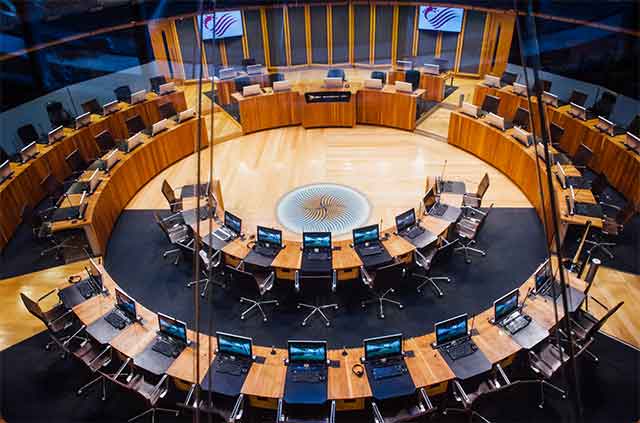A former minister urged the Welsh Government to cough up cash for a culture sector in crisis after being deprioritised in budget decisions since the start of devolution.
Alun Davies, the Labour MS for Blaenau Gwent, criticised cuts in the Welsh Government’s 2024/25 budget, warning arts funding has been down the pecking order for decades.
He said: “The politics of devolution has been that this government has deliberately taken a decision to deprioritise culture funding in terms of its overall budget.
“Not just because of the crisis today or yesterday but over the period of devolved self-government.”
With fears for the future of Wales’ national museum, library and opera, Mr Davies, a member of the Senedd culture committee, warned funding cuts are undermining cultural expression.
‘Leaking roofs’
Pressing Wales’ new culture secretary, he said: “I think if the Welsh Government is serious about what it says – then it has to put its money where its mouth is, quite frankly.”
Lesley Griffiths, who came into post in March, responded: “I don’t disagree with you about the funding and, obviously, we had to make some very difficult choices.
“I’ve come in at a time when, as you say, the budget has been cut significantly.”
She added: “The first week I was in post – everywhere I go, there seem to be leaking roofs; we’ve got these iconic buildings, which are very old, etc.”
Ms Griffiths, who is also responsible for social justice, said the Welsh Government will be launching a new cultural strategy in the next couple of weeks.
‘No substance’
Mr Davies highlighted an editorial in the final copy of Planet magazine, raising concerns its funding is worth less in real terms than when John Major was prime minister in the ’90s.
He told the committee: “The cuts, recently, have ended the magazine – it’s closed it.
“So, it’s very easy for successive ministers we see come here with strategies but if the people don’t exist, they disappear, they’ve gone.
“You’ve got a speech, you’ve got a strategy, you’ve got a press release but you haven’t got any substance behind it, and I think that’s the issue.”
Mr Davies said Welsh Governments of all complexions have deprioritised arts funding in relative terms, even despite wider funding increases when he was first elected in 2007.
‘Copy-and-paste job’
Delyth Jewell, who chairs the committee, raised concerns about the Welsh Government’s written evidence on culture and the new relationship with the EU.
She said swathes appeared strikingly familiar to a paper submitted by Wales Arts International, the Arts Council of Wales’ international arm.
Plaid Cymru’s deputy leader said: “There were quite a few sections that, it seems, were copied and pasted from what we received from Wales Arts International.”
During the evidence session with the Welsh Government, Ms Jewell called for assurances from Ms Griffiths, who was previously responsible for rural affairs.
Ms Griffiths replied: “Yes, absolutely. I’m very surprised to hear that. Obviously, it was before, as you say, I came into portfolio…. But, yes, I can assure you that it won’t happen again.”
‘Farcical’
Llŷr Gruffydd raised concerns about a “hugely disappointing” update from HSBC following the closure of its Welsh-language customer support phone line.
The Plaid Cymru politician, who represents North Wales, said the bank received 22 calls a day before moving to a system where customers can request a call-back in Welsh.
He warned: “It’s decreased to 17 calls every three months, which is a farce in terms of providing a service to customers.”
In a letter to the committee and Jeremy Miles, the Welsh language secretary, HSBC’s José Carvalho claimed customer feedback has been largely positive.
The head of wealth and personal banking said HSBC is reducing the maximum length of time for a call-back from three working days to the next working day.

